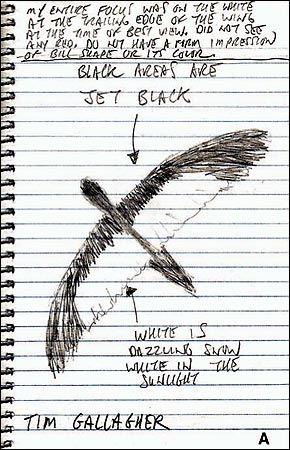IBWO: This Just Out
I guess I can stop keeping my promise to keep my mouth shut about what I know about the ivory-billed woodpecker (IBWO), since everyone in the world is talking about it now.
=====
 The identity of the authors certainly answers my question posed to Timothy Gallagher in the interview with him that I published on my blog as to why Jerome Jackson was not part of the original search team. Mr. Gallagher never did satisfactorily answer my question, as you'll notice.
The identity of the authors certainly answers my question posed to Timothy Gallagher in the interview with him that I published on my blog as to why Jerome Jackson was not part of the original search team. Mr. Gallagher never did satisfactorily answer my question, as you'll notice.The story as it stands today: The paper that questions the IBWO discovery was written by Richard O. Prum and Mark B. Robbins, ornithologists at Yale and the University of Kansas, and by Jerome A. Jackson, a zoologist at Florida Gulf Coast University and the author of the fine book, In Search of the Ivory-Billed Woodpecker, published in 2004 (pictured) and the Birds of North America account for this species. This paper has been submitted to a peer-reviewed journal, which could post the analysis online within a few weeks.
But the paper will be accompanied by a fierce rebuttal by the team that announced the discovery, and a response to that rebuttal by the challengers. "The people who originally announced this thoroughly believe they got an ivory-billed woodpecker," Dr. Robbins said in an interview.
 Everyone agrees that the bird that appears on the video tape is either an ivory-billed woodpecker, Campephilus principalis, or a pileated woodpecker, Dryocopus pileatus, a slightly smaller bird that is relatively common. Both species have a mix of white and black plumage. However, the ivory-billed woodpecker has a white trailing edge to its wings [the drawing by Tim Gallagher shows the white "trailing edge" of the wings of the bird he saw in flight in the field (right)] while the pileated woodpecker has a black trailing edge.
Everyone agrees that the bird that appears on the video tape is either an ivory-billed woodpecker, Campephilus principalis, or a pileated woodpecker, Dryocopus pileatus, a slightly smaller bird that is relatively common. Both species have a mix of white and black plumage. However, the ivory-billed woodpecker has a white trailing edge to its wings [the drawing by Tim Gallagher shows the white "trailing edge" of the wings of the bird he saw in flight in the field (right)] while the pileated woodpecker has a black trailing edge. "In my opinion," Mr. Jackson wrote in an e-mail message on Wednesday, "the data presented thus far do no more than suggest the possibility of the presence of an ivory-billed woodpecker. I am most certainly not saying that ivory-billed woodpeckers are not out there. I truly hope that the birds do exist in Arkansas or elsewhere and have been championing this idea for a long time."
For those of you who wonder what is happening regarding this bird, John W. Fitzpatrick, co-leader of the IBWO search party and director of the Cornell University Laboratory of Ornithology, said it was normal for scientists to disagree about evidence of this sort, especially because in this case the video in question was "pretty crummy."
To recap the evidence so far;
The video of the IBWO flying away from the boat (in the distance). This video is under dispute as to the species of the bird seen.
The abstract of the paper published in the journal, Science.
The Science paper announcing the IBWO discovery, also includes a link to the PDF of the complete paper and other links to the film, viewable in a variety of formats.
The excellent National Public Radio story, both print and streaming.
© 2004, 2005, 2006 by GrrlScientist











4 Peer Reviews:
Let's all remember that this is science. This is what scientists do. Hard evidence (the video) is all that can be questioned/analyzed. I've had many birders tell me that if this came before a state records committee they would not be able to accept it. PHOTOS! WE NEED PHOTOS!!!!
This is a wonderful clear post for those of us on the outside. Your blogs are a good archive of this process. It is always good to question, question, question...take nothing on hope or faith.
Okay, so I know absolutely nothing about birds, but this kind of evidence would NEVER hold up in my field. And I have a pretty good eye for video- I'm sorry to say I think I see a black trailing edge, not a white one, although I looked pretty hard.
I agree with the person who said photos would be better.
I think it's extremely cool that rebuttals and responses to rebuttals will be published alongside a paper. I wish that were more common in the molecular biosciences.
I agree, the evidence that is publically available is not good enough to definitively say that the IBWO is alive. I am glad to see that there is some scientific rigor regarding this astonishing discovery .. even though I am fairly certain that the IBWO DOES indeed exist, I still think we need to be careful to document this, as with all things scientific.
GrrlScientist
Post a Comment
<< Home